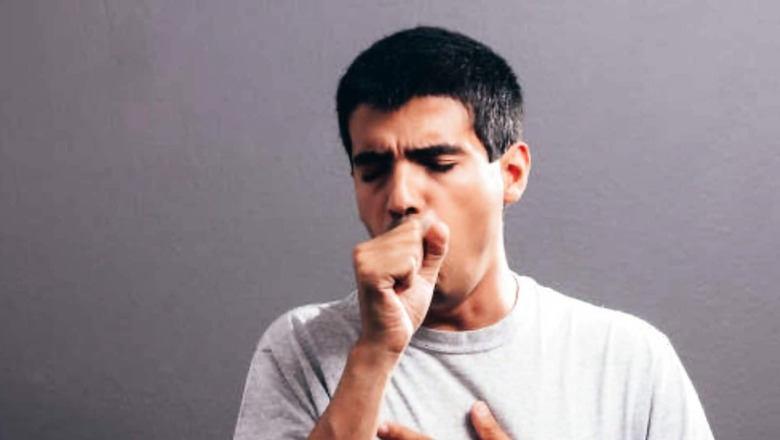
views
The situation in India has been challenging for the past few months as a large number of people have been experiencing persistent coughs, colds, and fever that is taking longer than usual to recover from. This viral illness is affecting not just adults but also kids. Doctors have reported that this is an unprecedented occurrence, and the normal flu that typically lasts 3-4 days is now taking anywhere from three to eight weeks to recover from. Unfortunately, even regular antibiotics are no longer effective in treating this illness, and steroids are required to alleviate symptoms.
This condition has caused significant concern and confusion among the public, leading them to turn to social media platforms such as Twitter and use the hashtag #MedTwitter in search of answers and advice. While the tweets are in bulk numbers, there’s just one common question that has emerged – Why are so many people being affected by viral and throat infections? According to the doctors, the dramatic increase in cases is not due to a single cause but is likely the result of multiple factors.
Environmental Degradation
The recent extreme weather fluctuations in India, including significant temperature changes and changes in relative humidity, are believed to be contributing to the increase in viral activity and transmission. This is particularly affecting vulnerable groups such as children and the elderly, who have less exposure and immunity to these pathogens. Dr. Amrin Dhanpurwala, an Ayurvedic Consultant, mentioned, “Rapid changes in the environment is taking a toll on people. For instance, February was never a hot month, it was half cold and mildly hot, but this year India witnessed the warmest February in 122 years. Such unexpected temperature fluctuations have majorly affected our immune system and contributed to an increase in the number of viral infections across the country.”
In addition to weather fluctuations, poor air quality contributes to this wave of flu. “Because of the renovation, construction, road work, and multiple construction sites across, the air quality has been very poor for the last three to four months,” quoted Paediatrician Dr. Nihar Parekh. However, he pointed out that AQI isn’t the sole reason behind this surge in flu cases. “It is not the places where AQI is poor like Mumbai, Delhi but even cities where AQI has always been good, children are going through high RSV (Respiratory syncytial virus) infections …multiple ear infections, etc.”
Dr. Dhanpurwala, on the other hand, believes that pollution is a problem that affects everyone, not just those living in particular cities. “Even villages are connected to cities in one or the other way. There would be a person travelling to a city regularly and returning with all the infections intact. Secondly, all the industrial and other waste gets dumped in or outside the village. So, largely everybody is a part of pollution.” She also stated that the use of chemical fertilizers in rural farming can lead to inhalation of pollutants and contribute to the problem.
Thence, while environmental factors are not the only cause of the increase in viral infections, they do play a significant role in weakening the human body and making it more susceptible to infection.
After Effects of Covid-19
Medicines and treatments used during the Covid-19 pandemic have had side effects on human bodies. “Steroids given during Covid had many side effects on our bodies. They made us less immune and affected us largely,” remarked Dr. Dhanpurwala. “Every child, everyone has been through some form of Covid a year or two years ago. It may not have been that severe at that time but the virus has left some scar in the lungs,” said Dr. Parekh. Due to this, our lungs have been compromised in a way that it’s now taking time for them to regenerate their normal strength, capacity and immunity and hence, resulting in our bodies to go through infections again and again. The post-Covid lung can, thus, be taken as another factor that has left humans at a risk of getting infected with more diseases.
Another theory for why some individuals, including children, may be experiencing more infections is the easing of Covid-19 restrictions that explains the hygiene hypothesis. “It means two years of indoors (activities), breathing clean air, eating good food, avoiding exposure to other children has drastically dropped down their immunity,” added Dr. Parekh. Hence, their lowered immunity and increased exposure to infectious agents could have led to an uptick in infections that are appearing to be more severe with a prolonged course of illness.
Mutation of Viruses
Viruses are constantly evolving and adapting to their environment. Covid-19, like many other viruses, has been present in the environment for a long time, but it has undergone certain mutations that made it more infectious or virulent. In the same way, many other viruses have undergone mutations that are now impacting human bodies differently. “Viruses have become stronger now. Earlier, our immune system could fight back the regular respiratory viruses that were causing colds, coughs, throat infections, etc. Now some viruses have become more powerful and our immune systems are not proving to be as effective at fighting them,” explained Dr. Dhanpurwala.
Unhealthy Lifestyle
There has been a growing trend in India towards consuming more processed and unhealthy foods while neglecting healthier options. Unfortunately, this trend has started showing negative consequences on our health and well-being.
Dr. Dhanpurwala said, “Consuming less healthy foods and not prioritising the intake of fruits and vegetables has been an ongoing issue for some time and due to that we are not getting the necessary nutrients to support a healthy immune system.”
While diet plays a significant role in overall health, other factors can also contribute to our susceptibility to illness. Behaviours such as neglecting to wear masks, attending large social gatherings, and living in unsanitary conditions can increase our risk of infection and make us more vulnerable to disease.
Another major reason why Indians are taking longer to recover from the flu is the frequent use of high doses of medication for minor ailments such as headaches and body aches, which is common to desi household. The ease of buying these medicines over the counter without any prescription only adds to the problem. This has led to a reduced effectiveness of these medications over time, potentially requiring higher doses to achieve the desired effect.
Dr. Dhanpurwala described this phenomenon of medical tolerance by saying, “The daily usage of high-powered medicines has increased so much that our bodies have become almost resistant to even 650 mg tablets. But doctors always begin a medical course with low doses that keep getting higher when the patient’s body doesn’t respond to them as expected. Therefore, it’s taking days and months for people to recover.”
“So, I believe that this extended illness is not based on one factor but many other including allergies, influenza virus and other viruses such as Rhino Virus, Adenovirus, and the like.”
Way Forward
While doctors and medical experts can identify various factors that contribute to prolonged symptoms of fever, cold, cough, sore throat, and body ache, individuals must understand that they also play a crucial role in their own recovery and ongoing health.
Taking preventive measures at home, such as maintaining a well-rounded diet, wearing masks, and avoiding behaviors that worsen coughs, can help reduce the risk of illness and support the immune system. Additionally, ensuring that children get enough sleep and older individuals engage in regular exercise and maintain a clean environment can also promote overall health and well-being. As Dr. Parekh suggests, by taking these steps, individuals can help reduce the spread of illness and support their own long-term health.
Read all the Latest Buzz News here


















Comments
0 comment